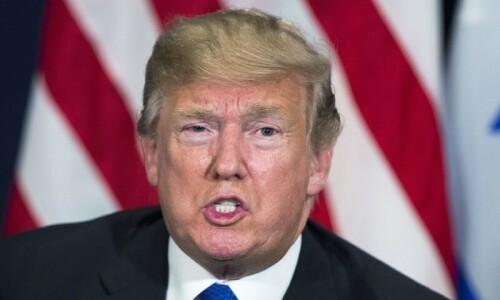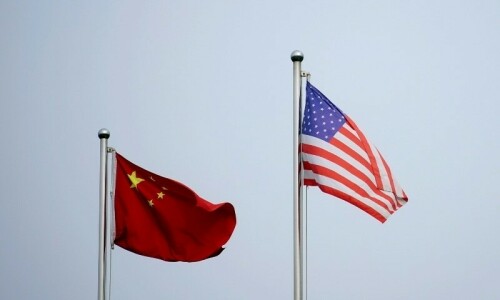KABUL: President Hamid Karzai said on Thursday he will meet President Barack Obama in Washington next month to discuss a postwar US role in his country, whose fragile security was highlighted hours earlier by a suicide bombing that killed one US troop and two Afghan civilians.
At a news conference with visiting Defence Secretary Leon Panetta, Karzai said he and Obama will discuss how many US troops will remain after the Western combat mission ends in December 2014.
He said he understands that immunity from Afghan laws for those remaining Americans is of ''immense importance'' to Washington, but he added that he has his own priorities in negotiating a postwar US role.
''Give us a good army, a good air force and a capability to project Afghan interests in the region,'' Karzai said, and he would be ready to argue ''with ease and with reason'' that his country should grant immunity to US troops.
Obama has said the US will not abandon Afghanistan and risk that it might revert to the al Qaeda haven it became in the 1990s after the Taliban came to power. Nor has he indicated what size and scope of post-2104 military mission he thinks is necessary and affordable.
The Taliban are a small but resilient force, even after 11 years of fighting a vastly larger US-led international force. They managed to send a dramatic reminder Thursday, claiming credit for the suicide bombing that killed three and wounded 17 near an entrance to Kandahar Air Field, the largest Western base in southern Afghanistan.
Panetta and his traveling party had left the air field about two hours before the attack.
The US military did not identify the American who was killed. It said an investigation was under way.
Panetta was at the air field for about three hours, receiving a briefing from US commanders. Panetta also spoke to about 350 US troops and took questions from them before flying back to Kabul, where he met with Karzai at the presidential palace.
Panetta described the Kandahar attack as further evidence of insurgent brutality.
''This is what they resort to in order to try to continue to stimulate chaos in this country,'' he said. ''They will not be successful.''
The Karzai-Obama meeting, which Panetta said would occur during the week of Jan. 7, with no specific date set, also is intended to discuss prospects for establishing a process for pursuing peace with the Taliban.
The main message of Panetta's two-day visit to Afghanistan was one of reassurance to Afghans that they will not be abandoned after 2014. And he made a pitch for patience among Americans tired of war.
''For the first time since 9/11 we have a chance to achieve the mission that we are embarked upon,'' Panetta said. ''To achieve that mission will require a continued commitment, continued perseverance, continued partnership and continued sacrifice on the part of our nations.''
He told Karzai that his country should not doubt US resolve to prevent the Taliban from regaining power and potentially facilitating al Qaeda's return.
''America will not turn away from Afghanistan,'' he said.
The Pentagon chief, who is expected to step down early in 2013 and return to private life, also made a plea for Pakistan to do more to clear al Qaeda, the Taliban and other extremist groups from havens on its side of the border with Afghanistan.
He said Pakistani leaders have often promised to take action, ''but have not followed through.'' Without such action, peace and security in Afghanistan will remain elusive, Panetta said.
Another major issue facing Panetta in the closing weeks of his tenure is how many US troops to withdraw from Afghanistan in 2013 and 2014.
There currently are 66,000 in the country, down from a peak of about 100,000 in 2011.
US Army Maj. Gen. Robert Abrams, commander of international forces in four southern provinces, including the key province of Kandahar, told reporters on Thursday that he foresees further troop cuts in coming months, but he did not specify whether he was talking only about US troops.
''I fully expect by next summer we will have less Isaf forces here because we'll need less Isaf forces,'' Abrams said, using the acronym for the US-led International Security Assistance Force. He said believes fewer will be needed because Afghan forces will be more capable by then.














































Dear visitor, the comments section is undergoing an overhaul and will return soon.